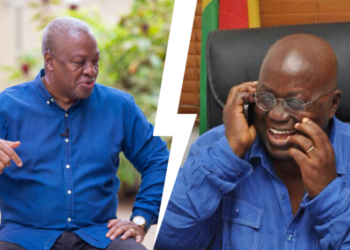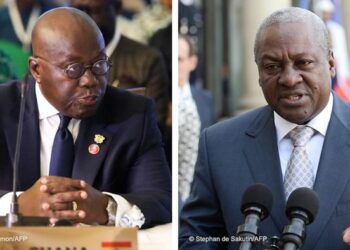The Minority Leader in Parliament, Haruna Iddrisu has called on Ghanaians to stop the Electoral Commission (EC) from going ahead to compile a new voter’s register for the 2020 Presidential and Parliamentary elections.
The Electoral Commission has presented to Parliament a Constitutional Instrument to amend C.I 91 to make Ghana card and passports the only form of identification before one could be captured onto the yet to be compiled new voter’s register.
Haruna Iddrisu in a statement issued on Friday, May 15, 2020, said if the Electoral Commission succeeds with the intended amendment and proceeds to compile the new voters’ register, millions of Ghanaians will be disenfranchised.
“I am therefore calling on Ghanaians to resist this blatant attempt by the Commission to amend or change the citizenship laws of Ghana through the backdoor by using an inferior Instrument to amend an Act of Parliament or by extension the Constitution intended to disenfranchise Ghanaians thereby denying them their fundamental right to vote as provided by the Constitution.”
The Electoral Commission also intends to include facial recognition as part of the properties the new voters’ register will have.
But according to Mr. Iddrisu, the EC has failed to submit a Constitutional Instrument (CI) to Parliament for same.
“But the most shocking revelation is that the Electoral Commission has not brought to Parliament a Constitutional Instrument for the purpose of capturing the facial details of prospective voters.”
NDC accuses EC, NIA of conniving to rig 2020 polls for NPP
The opposition National Democratic Congress (NDC) on Thursday, May 15, accused the governing New Patriotic Party (NPP) of conniving with the Electoral Commission and the National Identification Authority(NIA) to rig the 2020 elections.
According to the party, activities of the NIA and the Electoral Commission ahead of the 2020 polls are all geared towards making this possible.
The NDC argues that, out of the over 17 million individuals who have registered for the Ghana card, only some 6 million have received their cards, a development the party claimed could disenfranchise many Ghanaians.
We’re not conspiring with EC to rig 2020 polls – NIA replies NDC
However, the National Identification Authority (NIA) has rejected the National Democratic Congress’ claim that it is conspiring with the Electoral Commission (EC) to rig the 2020 general elections for the governing New Patriotic Party (NPP).
The NIA in a statement challenged the party to provide evidence to support its allegations.
“NIA is not part of the election management architecture in Ghana. There is no conspiracy between NIA and EC to rig the 2020 elections. Election rigging is a serious criminal matter with dire political, economic, and social consequences for any nation.”
“Any person, party or institution alleging such a criminal conspiracy has a duty to report same to the police and provide the requisite evidence to support investigations and/or prosecution.”
Find below the full press release from Haruna Iddrisu
CONSTITUTIONAL INSTRUMENT ON THE COMPILATION OF A NEW VOTERS REGISTER
We appear to be in interesting times! The Electoral Commission is saying that it is determined to compile a new voters registration to be used for the 2020 Presidential and Parliamentary elections in Ghana contrary to good counsel from Civil Society and well-meaning Ghanaians.
Their justification for the compilation of a new register is that the existing voter’s register is bloated and does not make room for facial recognition as a necessary concomitant to the biodata collected of existing voters on the register.
To prepare for the new register, the Electoral Commission has introduced into Parliament Constitutional Instrument No. 126 (Public Elections (Registration of Voters)(Amendment) Regulations, 2020) intended to amend Sub-regulation (3) of Regulation 1 of the Public Elections (Registration of Voters) Regulations (C.I. 91). Sub-regulation (3) of Regulation 1 of C.I. 91 establishes the primary documents required for verification of a person who presents herself or himself for registration as a voter.
The Electoral Commission, by the proposed amendment is seeking to limit primary documents to only the Ghanaian passport and a national identification card issued by the National Identification Authority.
A voter identification card, which derives its legitimacy from the constitution and particularly Article 42 of the Constitution of Ghana, 1992, is excluded from the list of primary documents.
But the most shocking revelation is that the Electoral Commission has not brought to Parliament a Constitutional Instrument for the purpose of capturing the facial details of prospective voters.
Facial recognition has far-reaching consequences for the enjoyment of fundamental rights of citizens and especially privacy rights. Technological determinism can have disastrously invasive negative effects on the lives of the citizens of this country. The failure of the Electoral Commission to avert its mind to the need for Regulations to guide this exercise is disconcerting!
Another critical omission by the Commission is the lack of or limited consideration or thought given to the consequences of the proposed amendment in C.I. 126. It will have the effect of unsettling the Citizenship laws of Ghana.
The Citizenship Act,2000 (Act 591) presumes a person born on or before 6th March 1957 to be a Ghanaian provided either parent or grandparent was born in Ghana. Therefore to establish whether a person is prima facie a Ghanaian, one needs to look at the person’s birth certificate.
Unfortunately, the Electoral Commission will have none of this! The Commission has unwittingly changed the presumption, and any person who appears at the registration centre without a passport or a national identification card issued by the National Identification Authority is presumed not to be a Ghanaian unless two people can vouch for that person.
In effect, a child who was born to parents and has a passport but whose parents have no passports or a national identification card issued by the National Identification Authority will have to be vouched for by the child. The child will impliedly confer Ghanaian citizenship on his parents contrary to the express provisions in the Constitution, 1992 and the Citizenship Act, 2000, Act 591.
I am therefore calling on Ghanaians to resist this blatant attempt by the Commission to amend or change the citizenship laws of Ghana through the backdoor by using an inferior Instrument to amend an Act of Parliament or by extension the Constitution intended to disenfranchise Ghanaians thereby denying them their fundamental right to vote as provided by the Constitution.
Source: Citinewsroom.com














